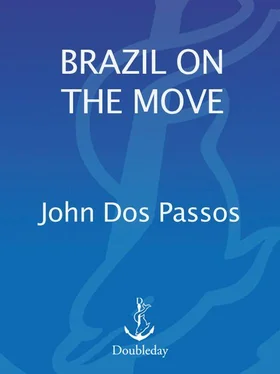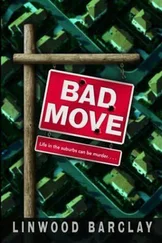Vargas’ Minister of War, General Eurico Gaspar Dutra, was elected President for a fiveyear term by a large majority in 1945. The Vargas machine conducted the election. The electoral boards ruled that approved members of Vargas’ labor unions should be registered automatically. They could be trusted to vote as they were told. Other people had to establish their right to vote by a literacy test.
Though Dutra was elected by the Vargas machine, he was a somewhat independent minded man and could rely on the support of a large body of pro-Allied opinion which had become increasingly vocal with the decay of the censorship. Brazilian historians speak of Dutra’s presidency as a period of democratic convalescence.
Parties were allowed to develop independently. Released from the threat of intervention by the federal government, political organizing began to center in the states. In São Paulo and Minas Gerais local machines flourished.
In Rio Carlos Lacerda was in 1946 elected to his first public office as vereador (city counselor) by a large majority. The very violence of his enemies helped bring him support. Three years later he gave the name of his column “Tribuna da Imprensa” to a newspaper of his own. It was the first newspaper in Brazil established by public subscription. People from all walks of life bought stock. Several wellknown soccer players chipped in. One day a group of cleaning women turned up at Lacerda’s office offering to contribute a few crumpled ten-cruzeiro bills.
President Dutra’s term would end in 1951. According to the current wording of the so often rewritten Brazilian constitution he could not succeed himself. Vargas, who had spent the five years in rural retirement on his estate at São Borja on the Argentine border, was urged to try again.
He had been watching his apt pupil, Juan Perón, apply his own version of the Estado Nôvo to the distracted republic on the River Plate. President Roosevelt’s death and the breakdown of leadership from Washington had left a political vacuum in the world. Communism poured in. The stock of democracy was sinking again on the international market.
Vargas was old and tired but his henchmen were hungry. The old machine was still intact in the Labor Party and the labor unions. He had an active yellow press at his disposal. His supporters united the Communists, whose watchword was now down with everything connected with the United States, with the leftovers of Fascist nationalism, the frustrated radicals who still dreamed of a socialist utopia, and with local industrialists who feared foreign competition. An adept in the corruptions of politics Vargas played on these factions with a master hand and easily defeated the colorless candidate of the Social Democrats and the Democratic Union’s virtuous brigadier.
The Brazilians were a youthful people, was how Lacerda explained the defeat of his party, statistically more than half the population was under eighteen. Many of the voters in 1951 were too young to remember the oppressions of the Estado Nôvo. Lacerda himself was bitterly reproached for libeling a good old man.
The old dictator’s victory threw the moderate politicians into confusion. People braced themselves for a new bout of dictatorship. The Democratic Union almost fell apart. Lacerda’s Tribune of the Press , with much greater influence than could be accounted for by its circulation, remained as a rallying ground for those opposed to totalitarian schemes.
After five quiet years, busied only with his ranches and his family, the good old man from São Borja moved back into the presidential palace in Rio. The ex-dictator felt a fatherly gratitude towards his people for having re-elected him their constitutional President. He sincerely believed he knew what was best for the Brazilians, but the Brazil he returned to was a changed country.
American financing during the war had given Brazilian manufacturing just the push forward it needed. Volta Re-donda was already turning out steel. Fortunes were being made producing consumer goods in São Paulo in spite of the collapse of the world market in coffee. Industries were spreading out from Rio and São Paulo into the hinterlands of Minas Gerais. Roads were beginning to improve. Public health measures stimulated the growth of population. The cities were bursting at the seams. Contractors were getting rich building apartments. In spite of an adverse balance of payments, inflation, bluesky speculation and every fiscal ill on the calendar, Brazil was on the verge of an industrial boom.
President Vargas, now a satisfied aging man with the old benevolent smile on his face, only wanted an easy life. He wanted everybody to think well of him without worrying too much about overcrowded cities or the problems of financing a vast irregularly developing nation.
The trouble was that his supporters, the party stalwarts who had dragooned the workingclass voters into electing him, weren’t satisfied. They were hungry. They couldn’t wait to fill their pockets. Even the members of Vargas’ own family became infected by the get rich quick fever. The lobbies of the presidential palace swarmed with influence peddlers and fixers, many of them gangsters and lowlives with police records. In the memory of man no one had seen such barefaced thievery as went on in Vargas’ last administration.
As scandal after scandal boiled to the surface, Carlos Lacerda made it his business to see that nobody forgot them. He was determined to stave off a dictatorship. After a second term as city counselor he was planning to run for the federal Chamber of Deputies.
He had discovered television. His face on the screen became a trade mark. The firm jaw, the clearcut nose between the dark shell rims of his glasses, through which glowing dark eyes burned into the consciousness of the audience, were unforgettable. Without talking down to the crowd he developed a way of explaining complicated problems so that they became understandable to a great many different sorts of people. Spoken, his editorials were even more effective than in the printed column.
As Vargas’ presidential term drew to a close the old man began to see retirement staring him in the face. Though a presidential campaign was already underweigh, designing voices whispered in the President’s ear that maybe all these elections weren’t in the national interest after all. The Vargas politicians wanted to hold onto their jobs. Rio hummed with rumors of a new dictatorship.
In his column in his afternoon paper Lacerda analyzed each new revelation. Evenings on TV he brought in facts and figures to back up his assertions. He drew charts of government malfeasance on a blackboard. His voice stung like a whip. It began to be reported that the men of Vargas’ personal bodyguard were threatening to kill him if he didn’t cease from his attacks. Lacerda shared his scorn of these threats with his TV audience.
Among the military there was considerable sympathy for Lacerda’s campaign. His support of Brigadier Gomes had made him popular among the younger officers. They couldn’t help admiring his courage. They shared his dismay at the corruption of the Vargas administration. Supporters in the Air Force took turns accompanying him home at night. They wanted to be sure he had a witness in case there was an attempt on his life. None of them imagined anybody would be so reckless as to shoot at an army officer.
The manifesto of a group of colonels had forced the resignation of one of Vargas’ ministers. The Ministry of Labor was politically the keystone of his administration because it controlled the patronage of the labor unions. Vargas’ Minister of Labor was a young neighbor from São Borja whom the old man had taken a fancy to and whose debut in politics he had sponsored in his home state. João Goulart was an attractive young landowner of great wealth reputed to be a crony of Perón’s. The colonels accused him of planning a syndicalist republic, Peronista style. Reluctantly Vargas submitted to the retirement of Minister Goulart.
Читать дальше












